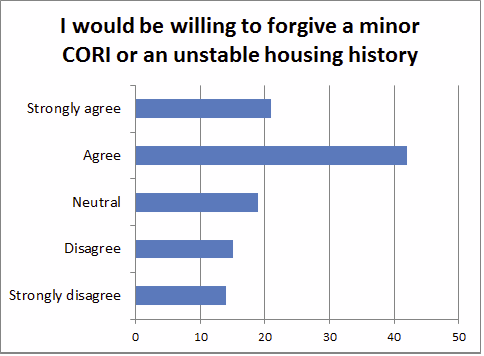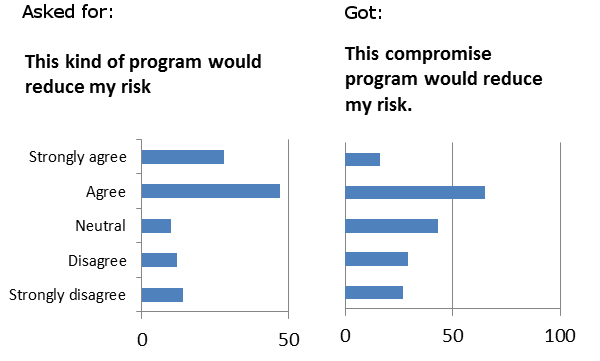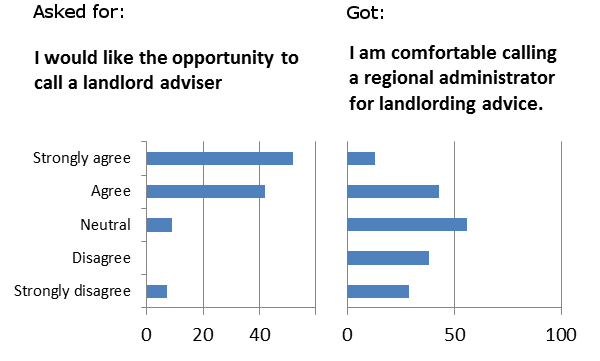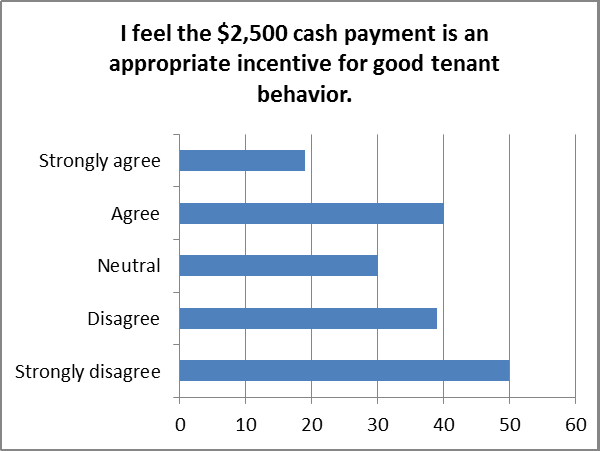Insurance Against Homelessness Compromise Feedback
| . Posted in evictions, insurance, News, policy - 0 Comments
Related Page:
Nov 2015 Update on Insurance Against Homelessness (aka "the Landlord-Tenant Guarantee")
In September we asked Massachusetts to pilot a new program based on the success of similar programs in Seattle and elsewhere. We asked that any landlord who takes a homeless family out of shelter should receive the following guarantee:
- $5,000 insurance for any unpaid rent;
- Equivalently large insurance in case of property damage, depending on region;
- $750 insurance for attorney’s fees in the event of an eviction;
- A 24 hour returned-call guarantee:
- Landlords could call a new independent, state-funded landlord adviser for assistance should problems arise (e.g., noise and nuisance, unauthorized residents, property cleanliness, etc.);
- Two years' insurance.
This insurance program would stack with existing subsidies. For instance, HomeBASE, MRVP or Section 8 would still be used to help the tenant afford the apartment.
We asked for this on the basis of your survey results and the deep statistical data from programs like the Seattle Landlord Liaison Project.
After much discussion, this is the compromise we got:
- $5,000 insurance total to cover unpaid rent, damage, and/or attorney’s fees;
- A landlord adviser and/or staff who may report to a regional housing administrator (like Metro Boston Housing Partnership, RCAP Solutions, or HAP Housing), to be determined by the Department of Housing and Community Development (DHCD);
- One year's insurance;
- After 12 months with no insurance claims or disputes, the tenant would receive $2,500 cash.
Do our readers like these changes? In a word, no. As of October 21, we had received feedback from over 155 landlords.
Related page:
- Positive feedback on the Landlord Liaison Project (October 25, 2015)
First, let's remember why landlord opinion matters. Under the original program, landlords were overall willing to forgive a minor CORI or unstable housing history:
That's a very positive result! It means that a program like the Seattle Landlord Liaison Project should be equally effective in Massachusetts at helping homeless families. By definition, they have unstable housing histories, and they tend to have minor CORI's as well.
Here's where the compromise starts to fall apart. When asked whether the compromise program reduced their risk, respondents tended to feel less agreement with the $5,000 cap, half of what we recommended. Responses to the program we asked for are at left, and to the compromise at right:
Here are representative statements from respondents:
- "The $5000 to cover unpaid rent, damages & legal won't go far to cover all three."
- "Increase the $5000 amount because that amount would not cover much."
- "I had to evict a tenant in 2009 and the lawyers fee was $5000 which could have been more. I was taken down by the free rent trick. $25K in total when I count up the ten month's of lost rent."
- "Altogether, with damage to the apartment ($2000 doing much of the work myself, so not reflected in cost), lost rent, legal expense and bogus complaints about nonexistent problems, I am out about $11,000 and had a horrendous year."
Large caps are a critical enticement to getting landlord participation.
The Seattle Landlord Liaison Project has data from the last five years of operating a program like this. They average $80,000 per year paid to an average of 12 landlords per year. That's $6,667 per claim. How can they operate such a program?
The key is that they make use of a landlord-focused advisor who can intervene before problems get to the point of costing money. They have housed over 1,500 families and 96% of them have not caused any losses whatsoever. Overall, the few large claims have been far cheaper than housing all these families in shelter.
Landlords understand the need to get good advice when facing the rare disaster. We asked survey respondents about the ability to call a landlord advisor. We saw a very clear signal in the proposed program. The compromise, however, moves the advisor into one of the regional administrators. Results became mixed:
Here are some representative comments, which as the graph shows range from positive to negative:
- "HAP is a tenant based agency. While there is one employee of HAP that could give good advice to a landlord, right now they are only part time. If they made an entire "landlord assistance" division then I would be more inclined. There would be a large learning curve to teach current HAP personnel how to properly advise landlords to act on tenant issues and I am not confidant they would be effective at the onset of this type of program."
- "I will not participate in this program if administered by existing programs such as MBHP, RCAP or HAP for handling landlord advise. That is like the 'Fox watching the chicken coop' "
- "Anything MBHP and DHCD have to do with, I strongly disagree. they both are most definitely not impartial."
Having a landlord-focused advisor in a new office is essential to the success of any landlord-tenant guarantee program.
What about the suggestion by MBHP that tenants should receive $2,500 as an incentive for good behavior? This was not part of what we asked for, since Seattle demonstrates that 96% of tenants behave well without such an incentive. Our reader data:
Here there is no clear signal, overall, but some landlords are deeply resentful:
- "Where do I go to get $2,500.00 for doing what a landlord should do? This is exorbitant!"
- "Who pays the $2,500 to the tenant? I think his reward for good behavior is that he gets to continue living in a nice place (same as for other people)."
- "Your original proposal is much better than the compromise. The state can't afford a new landlord adviser, yet can afford the $2,500 payments to families for behaving like normal, decent humans?"
A few are open to the idea:
- "The $2500 incentive is a good incentive."
- "$2500 incentive every year would help, but one time would not."
Our recommendation would be to do what Seattle already does, and to offer a security deposit for the next apartment if there are no claims. That avoids a "bright finish line" at the twelve month mark. The tenant may wish to remain in the rented premises, but the landlord would feel exposed with the reward having already been paid out.
Conclusion
For the homeless, this compromise would be better than nothing. But we need three changes before we can support the program wholeheartedly:
- The guarantee must last two years. This is what Seattle does, and it seems so non-controversial that we didn't even ask about it in the first survey. We were surprised it was dropped from the compromise.
- The guarantee cannot pay the tenant until they are definitely moving on to their next apartment, and then, it makes sense to limit to the payment to what is actually required for a security deposit.
- The landlord adviser must be a new, independent position outside of the regionals (just like in Seattle and Oregon).




